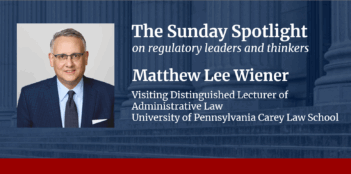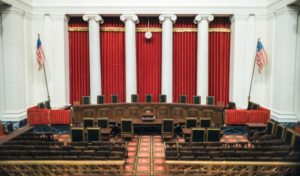
Agencies can welcome public participation while discouraging the submission of mass comments.
The Administrative Conference of the United States (ACUS) adopted Recommendation 2021-1 to improve agency handling of three types of comments: mass, computer-generated, and falsely attributed comments. The recommendation’s preamble defines these three types of comments, which may overlap in some respects, and it warns that “if not managed well, the processing of these comments can contribute to rulemaking delays or can raise other practical or legal concerns for agencies to consider.”
Recommendation 2021-1 is an excellent contribution that will assist agencies confronted with the three types of comments in “managing well.” As a senior fellow at ACUS, I participated in some of the Rulemaking Committee meetings leading to the development of this recommendation. And in a separate statement, I commended the hard work of committee chair Cary Coglianese, the committee members, and the ACUS staff in preparing the recommendation’s compendium of suggested best practices.
The recommendation’s preamble makes clear that it is limited to improving how agencies manage the processing challenges these comments pose. To make the point crystal clear, the recommendation states that it “does not address what role particular type of comments should play in agency decision making or what consideration, if any, agencies should give to the number of comments in support of a particular position.”
But that which was not addressed is an important question demanding attention: What decisional weight, if any, should the agency accord to the sheer number of mass comments filed in favor of, or in opposition to, a rulemaking proposal? The mass comments on which I am focusing here are those computer-generated form comments that contain little or no informational content beyond the expression of a “vote,” surrounded perhaps by some brief cursory boilerplate language.
I set forth my preliminary views in a separate statement that accompanied the publication of Recommendation 2021-1. What follows here are some further thoughts that, hopefully, will contribute in a constructive way to the consideration of the role of mass comments in an agency’s decision-making process.
I wish to emphasize that I recognize the value of widespread public participation by interested parties in rulemaking proceedings. Widespread participation is valuable not only because the contribution of facts, data, and argumentation it brings with it aids the agency in reaching a reasoned resolution of the issues presented, but also because the opportunity afforded by such participation gives the government’s exercise of lawmaking authority a democratic legitimacy it otherwise would lack.
That said, there should be widespread agreement that issues in rulemaking proceedings generally should not be decided through mere plebiscites, or the sheer counting of the number of mass comments for or against a particular proposal, even though, as law professor Nina Mendelson notes, there may be particular instances when it may be appropriate for the agency to consider those numbers as one factor relevant to consideration of particular issues.
The Federal Communications Commission’s (FCC) two most recent major rulemaking proceedings addressing the decades-old net neutrality controversies are perhaps the most notorious examples of mass comment wars having gone nuclear. Much has been written about the mass comment wars in these rulemakings, and, as the preamble to Recommendation 2021-1 points out, they have been the subject of official federal and state reports.
In a report issued in May 2021, the New York Attorney General Letitia James labeled as “fakes” 18 million of the 22 million filed comments in the FCC’s docket, with the number of pro and con “fakes” approximately equal. A college student filed 7.7 million comments in support of retaining net neutrality regulations, while internet service providers paid consulting firms $8.2 million to execute opposition strategies that included generating comments supporting repeal of the regulations.
It is likely that the FCC, with a change in the agency’s composition, once again will embark on yet another net neutrality rulemaking, this time proposing to reinstate rules that were adopted and then repealed in the two most recent proceedings. It would be naïve to assume that if the agency does so it will not set off another round of pro and con mass form comments—that is, another mass comment war.
So, what to do, not only concerning the FCC’s net neutrality rulemakings but with other rulemakings throughout the government that are most susceptible to comment wars?
Officials throughout the government, along with academics, bar associations, and other private organizations, such as think tanks studying administrative law and regulatory policy, should engage in elevated messaging campaigns designed to explain to the public that rulemaking proceedings are not plebiscites, but rather they are proceedings in which decisions are based on the persuasiveness of the facts and arguments submitted. Such messaging can be carefully designed so as not to discourage the submission of facts, data, and arguments that contribute to reasoned decision-making.
Regulations.gov is a principal venue for educating the public about participation in rulemaking proceedings, and it already has laid a good groundwork for heightened educational efforts. One of its tips for commentors explains that “the comment process is not a vote—one well supported comment is often more influential than a thousand form letters.”
The document further clarifies that “although public support or opposition may help guide important public policies,” agencies must base their decisions on “sound reasoning and scientific evidence rather than a majority of votes.” Regulations.gov ought to find other ways to promote these statements.
And individual agencies conducting rulemaking proceedings need to engage in the same sort of messaging, especially in those proceedings for which they have reason to anticipate a deluge of mass form comments that contain little more relevant content than “I support” or “I oppose.” For example, when the FCC commences the next iteration of its long-running battle over net neutrality, all the commissioners should issue a joint public statement briefly summarizing the issues in the proceeding and explaining what type of facts, data, and arguments will be most helpful in addressing those issues. The joint statement should state clearly that widespread public participation is welcome, but it should also remind the public, like Regulations.gov, that “the comment process is not a vote.”
Equally important, agency heads and commissioners should refrain from making statements that might be misconstrued as encouraging the filing of mass form comments for the sake of piling up votes. For example, when the last round of comments in the net neutrality proceeding was initiated, then-FCC Commissioner and current FCC Chair Jessica Rosenworcel stated that “the fight for an open internet is not over. It is time to make noise.”
Without purporting to know what was in Rosenworcel’s mind, I submit that urging the public “to make noise” is not conducive to fostering the type of public participation that advances reasoned decision-making. It is especially unproductive to encourage the public “to make noise” in a proceeding that already had been deluged with 22 million mass form comments, not to mention one over which net neutrality advocates led protests at the home of then-FCC Chair and one advocate even threatened that former Chair’s family.
At bottom, it is neither feasible nor desirable—either through changes in the Administrative Procedure Act or the rules of individual agencies—to adopt any strict measures that set hard limits on the submission of mass form comments. But it should be possible, through the adoption of focused educational messaging activities, both at the government-wide and agency level, to discourage such submissions.
To the extent that the public comes to understand better that the issues in rulemaking proceedings will not be decided as if they were plebiscites, individuals may be less likely to expend the time and resources involved in conducting mass comment campaigns.
This essay is part of a six-part series entitled Mass Comments in Administrative Rulemaking.




